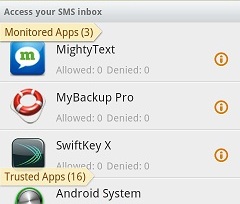Forget about viruses, trojans and botnets for a moment. The latest threat to smartphone users, according to mobile security firm Lookout, is pesky advertising.
This week, Lookout wrote a blog post to warn the world about “aggressive advertisers,” who use sleazy tactics such as taskbar notifications, browser bookmarks and home screen icons to get the attention of app users. Lookout analyzed a large pool of Android apps, and found that 5 percent used ad networks that deliver advertisements outside the apps themselves. Some of these networks also accessed personal information, such as e-mail, phone number and name, without clear notification.
The problem Lookout describes isn’t new, but if it’s news to you, don’t panic. There are tools you can use to detect notification ads and other annoying tactics, and to prevent these ads from taking over your phone. Here are a few:
Lookout Ad Network Detector
Lookout offers a free tool that analyzes your app library and tells you which permissions each one has. This is useful for finding the source of bad behavior, such as notification ads, automatic text messages and the collection of personal information. When you find an offending app, you can jump directly from Lookout’s tool to the uninstall page. The tool also provides web links to opt out of targeted ads from certain networks.
Airpush Permanent Opt Out
 Airpush is an ad network that’s notorious for sending notification ads to Android smartphones. Perhaps in an attempt to prove that it’s not evil, the company offers an app that lets users opt-out of receiving these notifications. Just open the app, and select “I Don’t Want Airpush Ads.”
Airpush is an ad network that’s notorious for sending notification ads to Android smartphones. Perhaps in an attempt to prove that it’s not evil, the company offers an app that lets users opt-out of receiving these notifications. Just open the app, and select “I Don’t Want Airpush Ads.”
You can also opt-out through Airpush’s website by entering your phone’s IMEI number, found in the “About” or “About Phone” section in Android settings.
GSam Battery Monitor
As long as you’re hunting for bad apps, you might want to install GSam Battery Monitor, which can tell you whether any individual apps are a source of battery drain on your Android phone. After all, free apps can sometimes drain your battery because they download fresh ads on a regular basis, and sometimes upload user information.
LBE Privacy Guard
 I’m recycling one suggestion from my list of tools for the online privacy paranoid.
I’m recycling one suggestion from my list of tools for the online privacy paranoid.
LBE Privacy Guard shows the permissions for all your Android apps, including which types of personal data they can access.
If you have a rooted phone, the app can prevent individual apps from sending certain types of data.
Is All This Necessary?
My general feeling about smartphone security threats is that the companies making the most noise are the ones who are in the business of selling mobile security software. The odds that you’ll get hit with adware, malware or other threats on your smartphone are still fairly low.
On Android, the risk is a bit higher than other platforms because of the extra permissions that apps enjoy, but then you get extra benefits in return, such as the ability to read and send text messages from a PC.
Still, it’s always helpful to be aware of potential dangers. I don’t think every Android user needs to install these apps right now, but they’re worth keeping in mind if you’re suddenly getting hassled by some nefarious ad network.

